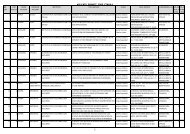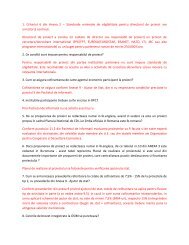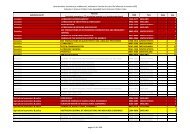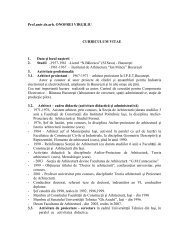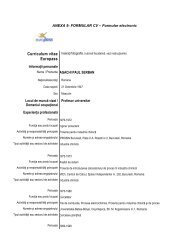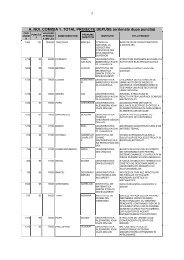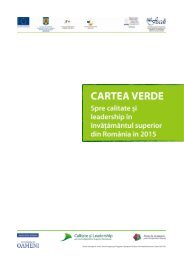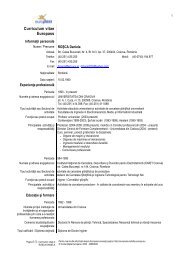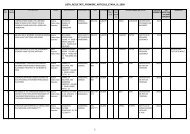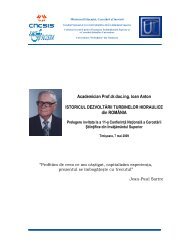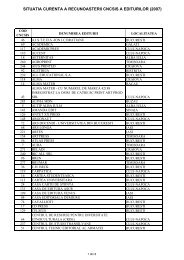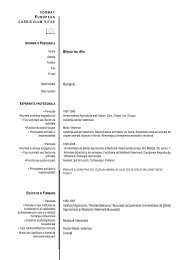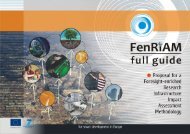Modul de formare-Managementul resurselor financiare - uefiscdi
Modul de formare-Managementul resurselor financiare - uefiscdi
Modul de formare-Managementul resurselor financiare - uefiscdi
- No tags were found...
Create successful ePaper yourself
Turn your PDF publications into a flip-book with our unique Google optimized e-Paper software.
level of the university hierarchy. To combat the inflexibility that characterizes a lot of budgets<br />
once established and to improve their functionality in the strategic control it has been <strong>de</strong>veloped<br />
several types of budgets:<br />
flexible / variable budget<br />
Typically, a budget is set for a given level of incomes and a certain level of expenditures of<br />
resources. Since the flexibility of budget estimates is a requirement to increase efficiency and to<br />
achieve a good planning, the flexible or the variable budgets are wi<strong>de</strong>ly used.”The variable<br />
budget or flexible budget shows the resources to be allocated for each university activity<br />
according to their level of the activity” 21 . Therefore this variable budget will automatically<br />
signal to the university top management the additional resources allocation necessity for various<br />
activities of the university when the activity level will record an increase and a <strong>de</strong>crease in the<br />
allocated resources when the activity level will experience a <strong>de</strong>cline.<br />
The zero base budget<br />
Another type of budget which is part of the same ten<strong>de</strong>ncy of the university budget system to<br />
adapt better to the changes of university’s internal and external conditions, is the zero-base<br />
budget, applicable particularly in the support activities domain - research, <strong>de</strong>velopment,<br />
marketing, finance, staff - taking into account the wi<strong>de</strong>r margin available to the costs<br />
<strong>de</strong>termination for these activities. According to experts, the zero-based budget is a planning<br />
and <strong>de</strong>signing process of the budget which means that the university managers have to justify in<br />
<strong>de</strong>tail the entire budget, not only to refer to the amounts of the previous years budget. The<br />
specialists in university financial management consi<strong>de</strong>r "the zero base budget" a better and<br />
more effective tool than the traditional budget - which takes as his starting point the amounts in<br />
the budget for the previous year, focusing on the i<strong>de</strong>ntification and the control of the each<br />
element of the budget. The advantage of using this type of budget is that it requires the<br />
managers to establish the new programs and their costs regardless of the past<br />
accomplishments, but according to the conditions expected in which those programs will be<br />
materialized.<br />
2.2. The revenue and expense budget – a tool to ensure the financial balance at the<br />
university level<br />
The university budget can fulfill its objective of materializing the Development Institutional<br />
Strategic Plan only in the conditions in which it brings together all the resources in a single<br />
budget meaning:<br />
• amounts obtained through an institutional contract from the ministry as a basic<br />
funding <strong>de</strong>pending on the number of the equivalent stu<strong>de</strong>nts for each areas, cost factors (for<br />
adjustment) for each areas and qualitative indicators, the overall amount representing the<br />
base national funding;<br />
• amounts obtained through an additional contract from M.E.C.T.S., funds obtained<br />
based on competitive criteria, allocated for equipment, costs of the university and major<br />
repairs, subsidies for stu<strong>de</strong>nts accommodation, funds for scientific research;<br />
• extrabudgetary sources consisting of: incomes from school fees and administrative<br />
charges, incomes from publishing courses and non-regular publications, incomes from<br />
services, rental of spaces, external cooperation, donations, sponsorships and other nonrefundable<br />
amounts used according to the <strong>de</strong>stinations of each incomes category, own<br />
incomes from university-canteens, the publishing business, amounts from the external<br />
financing.<br />
21 Trenca, I., I., "<strong>Managementul</strong> financiar al întreprin<strong>de</strong>rii", Ed. Mesagerul Cluj – Napoca, 1997;<br />
20



